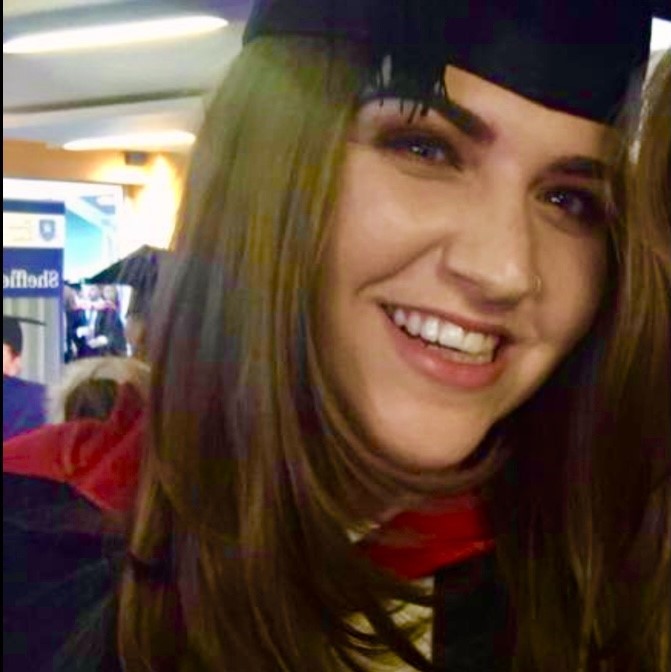Georgina Byrne-Watts: Leading Collaborative Health Strategies as ARC NWC Intern

With a strong emphasis on collaborative production, addressing health inequalities, and deploying proactive measures, ARC NWC intern Georgi Byrne-Watts, is actively reshaping the framework of community health and social care initiatives at The Life Rooms – Mersey Care NHS Foundation Trust. Georgi’s project, titled “Examining the Integration of the Life Rooms Social Model of Health within an Early Years Setting,” aims to refine and implement innovative strategies for enhancing community well-being.
Georgi, who works alongside the ARC NWC Improving Population Health theme, explains, “At Mersey Care NHS Foundation Trust‘ , we collaborate across sectors to address the social determinants of health, The Life Rooms and this particular project focused on early childhood, and aimed to break intergenerational cycles which have a negative impact on young people and support families who need it most.”
Georgi’s research aligns with national priorities, as set forth in the NHS Long Term Plan, and is in accordance with governmental initiatives aimed at improving the lives of individuals facing difficult circumstances.
The study focuses on examining the integration of The Life Rooms Social Model of Health within an Early Years Setting, underscoring the urgency of early intervention and advocating for holistic, community-driven approaches to address disparities and enhance overall well-being.
The Life Rooms initiative is pivotal in introducing a social model of health into traditionally clinical settings, Georgi explains “We acknowledge the importance of addressing social elements alongside medical factors in the challenges people face. Our regional priority is to support these families, promote family well-being, and work preventatively to mitigate the need for future services.”
“It can be difficult to measure impact for this project as it is intergenerational; it may not be seen until the next generation grows up,” Georgi notes. “Our project has sparked significant internal reflections and adjustments in our approach. It has transformed our view on service delivery, highlighting the importance of meeting communities where they are rather than expecting them to come to us.”
“Consulting with staff, parents, and carers enabled us to understand individuals requirement for the service we provide,” Georgi elaborates. “This transition has led us to adopt a hub and spoke model, enabling more peripatetic working to ensure wider community engagement. Additionally, a pivotal aspect of our work has been the upskilling of staff within children’s centres to effectively support individuals facing mental health challenges.”
“We identified a gap in their experience and confidence in addressing these issues, particularly as the complexity and severity of mental health concerns among children and families continue to rise,” Georgi continues. “Through targeted training sessions covering topics such as suicidal ideation and psychosis, we equipped our colleagues with the necessary skills and expertise to engage in these crucial conversations and provide appropriate support.”
Georgi has also engaged in extensive research dissemination efforts, including attendance and presentation at international conferences such as the Salus – Global Knowledge Exchange conference. This has provided an invaluable platform for sharing insights and findings. Georgi delivered a dedicated presentation, ensuring the project’s exposure at an international level.
Additionally, Georgi has pursued dissemination opportunities at national events with policy makers such as ARC NWC member organisation Liverpool City Council and submissions for various prestigious awards.
The project has already secured accolades for its positive practices in mental health, and further applications have been made for a range of awards. Plans are underway to submit the research for consideration in the Health Service Journal (HSJ) awards, reflecting a commitment to professional recognition and the wider dissemination of impactful research outcomes.
“This investment in capacity building not only enhanced immediate service provision but also left a lasting legacy, empowering staff with valuable knowledge and resources,” Georgi concludes. “Looking ahead, we aim to leverage these experiences to inform future implementations, drawing on the flexibility and adaptability of our model to address similar challenges in different settings.”
Georgi expresses immense gratitude for the opportunities and growth facilitated by knowledge sharing within her field from ARC NWC. “I am profoundly grateful for the invaluable support and guidance extended to me by my supervisors, Dr. Kathryn Berzins and Dr. Danielle Christian, throughout my internship. Their unwavering mentorship has played a pivotal role in enhancing my skills and adaptability, especially considering the demands of full-time work. It has truly made a remarkable difference in my journey.”
“Attending ARC showcases has had a profound impact on me, exposing me to innovative methodologies and inspiring projects,” she adds. “My journey exemplifies the transformative power of collaborative learning and emphasises the importance of ongoing knowledge exchange in professional development, so much so my next step is applying for a PhD.”
Learn more about ARC NWC intern opportunities here: ARC NWC Internships